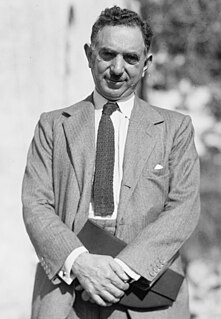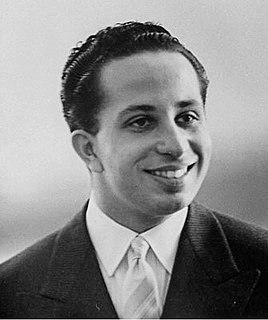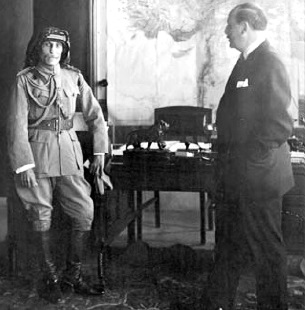
Abdulaziz bin Abdul Rahman Al Saud, known in the West as Ibn Saud, was an Arab tribal, political, and religious leader who founded Saudi Arabia, the third Saudi state. He reigned as the first king of Saudi Arabia from 23 September 1932 to his death in 1953. He had ruled parts of the kingdom since 1902, having previously been Emir, Sultan, and King of Nejd, and King of Hejaz.

Faisal I bin Al-Hussein bin Ali Al-Hashemi was King of the Arab Kingdom of Syria or Greater Syria in 1920, and was King of Iraq from 23 August 1921 to 1933. He was the third son of Hussein bin Ali, the Grand Emir and Sharif of Mecca, who was proclaimed as King of the Arabs in June 1916.

Yasin al-Hashimi, born Yasin Hilmi Salman, was an Iraqi politician who twice served as the prime minister. Like many of Iraq's early leaders, al-Hashimi served as a military officer during Ottoman control of the country. He made his political debut under the government of his predecessor, Jafar al-Askari, and replaced him as prime minister shortly after, in August 1924. Al-Hashimi served for ten months before he was replaced, in turn by Abd al-Muhsin as-Sa'dun. Over the next ten years he filled a variety of governmental positions finally returning to the office of prime minister in March 1935. On 30 October 1936, Hashimi became the first Iraqi prime minister to be deposed in a coup, which was led by General Bakr Sidqi and a coalition of ethnic minorities. Unlike al-Askari, who was then his minister of defense, al-Hashimi survived the coup and made his way to Damascus, Syria, where he died three months later. His older brother and close ally, Taha al-Hashimi, served as Prime Minister of Iraq in 1941.

Nuri Pasha al-Said CH was an Iraqi politician during the British mandate in Iraq and the Hashemite Kingdom of Iraq. He held various key cabinet positions and served fourteen terms as the prime minister of Iraq.

Gertrude Margaret Lowthian Bell, CBE was an English writer, traveller, political officer, administrator, and archaeologist who explored, mapped, and became highly influential to British imperial policy-making due to her knowledge and contacts, built up through extensive travels in Syria-Palestine, Mesopotamia, Asia Minor, and Arabia. Along with T. E. Lawrence, Bell helped support the Hashemite dynasties in what is today Jordan as well as in Iraq.

Al Anbar Governorate, or Anbar Province, is the largest governorate in Iraq by area. Encompassing much of the country's western territory, it shares borders with Syria, Jordan, and Saudi Arabia. The provincial capital is Ramadi; other important cities include Fallujah and Al-Qa'im.

The Kingdom of Iraq under British Administration, or Mandatory Iraq, was created in 1921, following the 1920 Iraqi Revolt against the proposed British Mandate of Mesopotamia, and enacted via the 1922 Anglo-Iraqi Treaty and a 1924 undertaking by the United Kingdom to the League of Nations to fulfil the role as Mandatory Power.

The tribe of Shammar is a tribal Arab Qahtan confederation, descended from the ancient Yemeni tribe of Qahtan as they originated in Yemen before migrating into present day Saudi Arabia. It is one of the largest and most influential Arab tribes. The historical and traditional seat of the tribe's leadership is in the city of Ha'il in what was the Emirate of Jabal Shammar in Saudi Arabia. In its "golden age", around 1850, the tribe ruled much of central and northern Arabia from Riyadh to the frontiers of Syria and the vast area known as Al Jazira in Northern Iraq.

The Hashemite Kingdom of Iraq was a state located in the Middle East from 1932 to 1958.
The Iraqi revolt against the British, also known as the 1920 Iraqi Revolt or the Great Iraqi Revolution, started in Baghdad in the summer of 1920 with mass demonstrations by Iraqis, including protests by embittered officers from the old Ottoman Army, against the British who published the new land ownership and the burial taxes at Najaf. The revolt gained momentum when it spread to the largely tribal Shia regions of the middle and lower Euphrates. Sheikh Mehdi Al-Khalissi was a prominent Shia leader of the revolt. Using heavy artillery and aerial bombardment, the uprising was suppressed by the British.

The 14 July Revolution, also known as the 1958 Iraqi coup d'état, took place on 14 July 1958 in Iraq, and resulted in the overthrow of the Hashemite monarchy in Iraq that had been established by King Faisal I in 1921 under the auspices of the British. King Faisal II, Prince 'Abd al-Ilah, and Prime Minister Nuri al-Said were executed by the military.
Al-Baggara or Bakara is an Arab tribe of the Euphrates tribes spread widely between Syria, Jordan and Turkey. The tribe was named by the name of their grandfather, Imam Muhammad al-Baqir, one of the grandsons of Ali ibn Abi Talib.

The Arab Kingdom of Syria was a self-proclaimed, unrecognized state that began as a "fully and absolutely independent... Arab constitutional government" announced on 5 October 1918 with the permission of the British military, gained de facto independence as an "Emirate" after the withdrawal of the British forces from OETA East on 26 November 1919, and was proclaimed as a Kingdom on 8 March 1920.

Iraqi nationalism is a form of nationalism which asserts the belief that Iraqis are a nation and promotes the cultural unity of Iraqis of different ethnoreligious groups such as Mesopotamian Arabs, Kurds, Turkmens, Assyrians, Chaldeans, Yazidis, Mandeans, Shabaks, Yarsans, and others. Iraqi nationalism involves the recognition of an Iraqi identity stemming from ancient Mesopotamia including its civilizations and empires of Sumer, Akkad, Babylon and Assyria. Iraqi nationalism influenced Iraq's movement for independence from Ottoman and British occupation. Iraqi nationalism was an important factor in the 1920 Revolution against British occupation, and the 1958 Revolution against the British-installed Hashemite monarchy.
Bani Malik or Banu Malik is one of the major Arab tribes of the Arabian Peninsula. They are descendants of Malik al-Ashtar al-Nakh'ei who fought with Ali ibn Abi Talib, the cousin of the Islamic prophet Muhammad.

Faisal II was the last King of Iraq. He reigned from 4 April 1939 until July 1958, when he was killed during the 14 July Revolution. This regicide marked the end of the thirty-seven-year-old Hashemite monarchy in Iraq, which then became a republic.
This is a timeline of major events in the history of the modern state of Jordan.

Ramaḍān Pāshā al-Shallāsh was a prominent rebel commander of the 1925 Great Syrian Revolt and, prior to that, a military officer in the Ottoman and Sharifian armies.

The siege of Najaf was an engagement between the British Army and Iraqi rebels in the city of Najaf during the First World War. The city had fallen under the control of four sheikhs in 1915 after an anti-Ottoman uprising, and was put under British control in 1917. In 1918, as it became clear that the British were aiming to occupy rather than liberate Iraq, an anti-British movement named Jam'iya al-Nahda al-Islamiya was formed in Najaf to oppose British rule. The uprising began on 19 March when a British officer, W.M. Marshall was murdered in the citadel of Najaf. The British subsequently laid siege to the city on 23 March, cutting all supply routes to the city before it ultimately surrendered on 4 May 1918. Rebel leaders were sentenced to death on 25 May. The extent of the rebellion's impact on the development of Iraqi nationalism is disputed.
Sheikh Shaalan bin Inad Abu al-Jun was an Iraqi politician, and one of the leaders of the Iraqi revolt of 1920.














